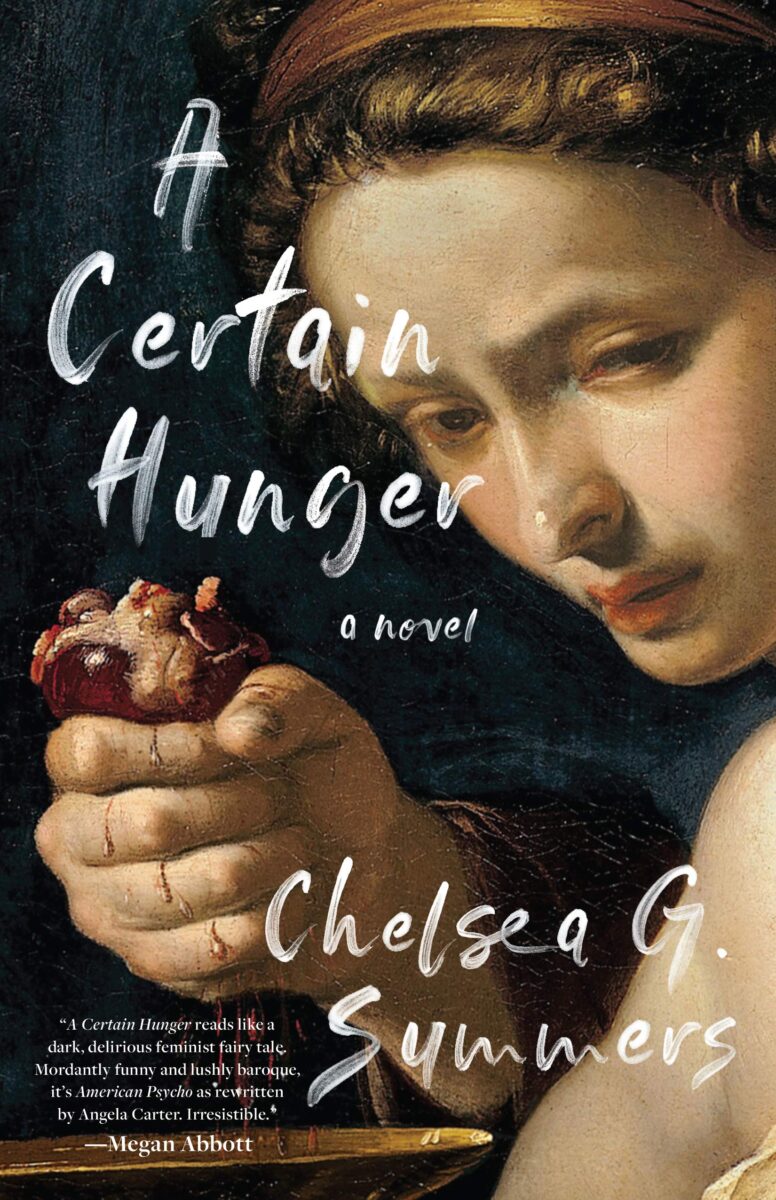Sometimes a book is so good that you go look up whatever else the author has written and devour that, too. And then sometimes a book is so very, very good that when you learn the book is a debut, you nonetheless go find the press that published such an audacious novel and start planning to read whatever they’ve done because they must have good taste; and you also find the author’s agent and see whomever else she’s representing, because she also must have impeccable judgment. It was a risk, after all, to take on a book with the pitch “psychopathic food critic starts eating people, sexily.” But it was absolutely the right risk to take. Because Chelsea G. Summers’s A Certain Hunger is a gamechanger.

After scores of Hannibals and Dexters and Batemen crowding the scene, it’s past time we see a psychopathic murderess take the stage. Thus far there’s only really been Ayoola from My Sister, The Serial Killer,* and that was not a first-person accounting of murder and mayhem but rather an exasperated tale of cleaning up the bodies. Maren Yearly from Bones and All may have been a murdering cannibal, but out of strange necessity, not glee. Other mediums have slightly more offerings—Villanelle from Killing Eve comes to mind—but by and large the field is extremely open.
So welcome to Dorothy Daniels, food critic with an equally healthy appetite for sex and for murder. She’s re-treading a bit of the Hannibal ground especially, what with the connoisseur cannibalism, but there’s no police procedural or cat-and-mouse game to be seen here. Her best friend is an artist, not a profiler, and all her psychological insights are focused on one subject: herself, and all her myriad desires. This isn’t Thomas Harris; it’s Patrick Suskind’s Perfume, but for taste instead of smell.
As with Perfume, A Certain Hunger is not for the faint of heart or stomach. Though it’s exquisitely written, it certainly revels in its gore, and elides that gore with the other human functions that society has tidied up but never really tamed: eating and fucking. This book is the pinnacle of carnality, the essence of embodiment in all its gross and morbid delights. I’m reminded of reading The Agony and the Ecstasy by Irving Stone, who describes the marble Michaelangelo sculpted as carne, practically toothsome to the artists who worked with it. Art, no matter how ethereal and eternal, is the product of the physical.
In our strange bastard tongue, the word meat is curiously divorced from its subject matter, linguistically speaking. Most romance languages don’t beat about the bush with carne. Even German, English’s awkward divorcee dad, calls it fleisch, flesh. French is slightly more coy in calling it viande, “from life,” but English’s “meat” takes the cake, an abashed abstraction descending from words for general foodstuffs—and a homonym for a generic encounter.

This may be incidentally apt—Dorothy surely does “meet” and “meat” with equal gusto—but the fact remains that our language is as squeamish as our culture when it comes to eating animals. Discretely packaged body parts await us in sanitized freezers, scrubbed of any hint that what was alive is now dead. Dorothy hates that. Dorothy wants to change that.
Why she wants to change it with human meat is a bit more complicated, and ultimately hinges on some discussions of love and feminism and what it means to be an older woman in a youth-obsessed world that I don’t entirely buy. Certainly they’re compelling, but Dorothy claims a desire for immortality through notoriety—a notoriety she did everything to avoid, since she never actually wanted to get caught. We cannot entirely trust Dorothy’s account, her justifications after the fact. I like this subtle untrustworthiness, so much more interesting than more bombastic forms of insanity. It makes Dorothy seem real. After all, we all contain contradictions, especially that desire to be known—but maybe only to our fans and not our detractors.
I’m reminded of the tongue-in-cheek Serial Killer Convention from Neil Gaiman’s Sandman, which features a panel of female serial killers bemoaning the glass ceiling even in the world of murder: “I tell you, I’m sick and tired of women in our line being stereotyped as black widows or killer nurses. I’m a serial killer, and a woman, and I’m proud of it” (The Doll’s House, 165). Dorothy embodies this strange liberation, is magnificently unabashed by any of her impulses. We’ve already talked ad nauseum about likable vs. unlikable women and their ability to anchor plotlines or sell books or tickets or what-have-you. What Dorothy Daniels brings to the table is the contradiction of an eminently likable but ultimately despicable woman. I found myself wishing that she would somehow be let out of jail, that she could go back to her gourmand lifestyle from which she took such ravenous joy. So many people undercut their happiness with shame and doubt; Dorothy’s intense and unapologetic delight is refreshing.
A Certain Hunger is, in a way, the mirror opposite of Ottessa Moshfegh’s novels, in which the characters do mundane or even admirable things, but with prose that glorifies the discomfiting or outright gross so that the whole effect is—there is no better word—icky. Moshfegh’s characters are beset by self-reflection, twisted and obsessed by it; Dorothy is equally self-obsessed, but only insofar as she’s perpetually delighted by her own cunning and success.
But…is she cunning? Not as much as she believes herself to be. And we know she’s not exactly the poster girl for success, since this is being written from the inside of a jail cell. Dorothy is a charming but necessarily unreliable narrator, falling victim (pardon the word choice) to the psychopath’s fatal flaw: ego. Dorothy is profoundly narcissistic, which makes her unable to see in others what she cannot see in herself. When she assumes she is the smartest, most capable person, she fails to account for the intelligence and capability of others. And when she assumes everyone is conniving and destructive, and it leads to her downfall in a fittingly un-spectacular way.
Yes, I did cheer her downfall as much as I was eager for her success. Not content with a character full of contradictions, Summers can produce those selfsame contradictions in her readers, which is a nice feat. This is not an easy book. There are these absolutely delightful little asides and one-liners, presented with absolutely no fanfare because Summers is too clever to bother setting up or relishing in her own jokes. They’re sprinkled into prose that also tends toward the truly glorious, a true celebration of food and language. And yet it’s impossible to be gluttonous with this book. It’s so visceral that I had to put it down, repeatedly, and remind myself that squeamishness is unbecoming of both readers and eaters. And then I still had to take a few deep breaths. This is not just carnal, it’s visceral. Not just the flesh and fat, but the stink of every inedible bit of gristle and gall splayed out and going bad. No, this is not an easy book—but it is a great one, and I’ll be digesting it for a long, long time.
*I also know of C. J. Skuse’s Sweetpea, but it’s not available in the US that I’ve been able to find. More suggestions welcome!
